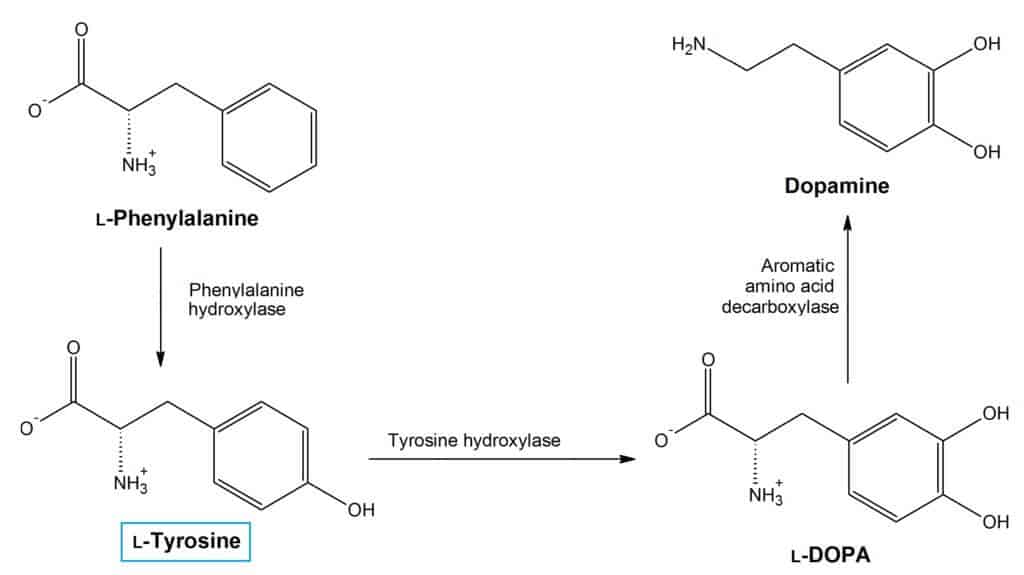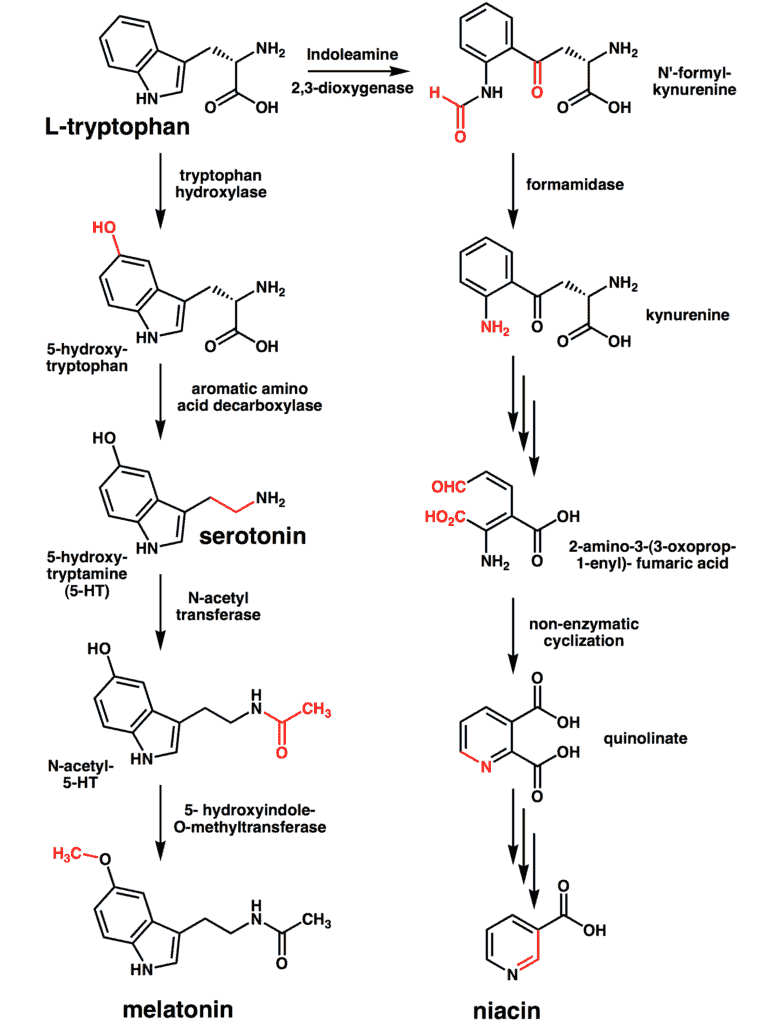Nootropics appear to be a rapidly-growing trend in the supplement industry, with some of the most popular ones being L-tyrosine supplements.
Those who are constantly coping with stress might find themselves easily attracted to the claims that L-tyrosine manufacturers make about it being a stress-reliever.
But, just how much of this is true? Can L-tyrosine reduce your stress and give your brain the boost it needs? Read on to find out.
What is L-Tyrosine?
As you might have guessed from the “L” in its name, L-tyrosine is an amino acid.
Your body utilizes this amino acid to create catecholamines – in particular, dopamine and norepinephrine.
Dopamine is a neurotransmitter involved in creating motivation, arousal, reward, and motor control.
Norepinephrine acts as both a neurotransmitter and hormone, performing functions in both the sympathetic and central nervous systems (SNS and CNS, respectively).
Both of these neurochemicals are essential for your brain and body to properly function.
A lot of the L-tyrosine you get comes from your diet. It is present in dairy products, chicken, and soy.
However, some of us simply do not get enough of it from our diets.
Your body should be doing a good job of regulating catecholamines on its own and converting L-tyrosine into L-DOPA.
In other words, you might not increase your norepinephrine and dopamine levels just by getting extra L-tyrosine, according to NCBI.
According to MyFoodData, there is, however, some evidence to suggest that L-tyrosine acts as a buffering system against intense physical and emotional stress.
So, while it does not relieve stress, L-tyrosine seems to have some ability to protect you when your cortisol (your “stress” hormone, released by the adrenal gland) level gets too high, Examine.com reports.
According to BrainTropic, L-tyrosine is an amino acid that acts as a buffer against stress, even though it is not directly a stress reducer.

L-Tyrosine Uses
The number one use of L-tyrosine is probably pretty obvious by now.
Many people who try it use it for its ability to protect them against cognitive decline due to physical and emotional stress.
Those who take it to reduce stress tend to report that they experience some relief when taken during or just after a bout of acute stress.
Of course, L-tyrosine itself does not seem to be an actual stress-reliever, although results seem to consistently show that it acts as a buffer.
L-tyrosine also appears to have an impact on cognitive abilities, even while the body and mind are under stress.
The cadets who were being studied were all undergoing a rigorous and stressful combat training course, and those who were provided with L-tyrosine showed improved cognitive abilities during memory tasks.
Additionally, L-tyrosine seems to provide a cognitive boost in sleep-deprived individuals.
According to NCBI, a 1995 study of on this subject revealed that sleep-deprived participants performed better in assigned cognitive skills (including memory) tasks than their peers who received a placebo.
These results make L-tyrosine seem like a helpful nootropic for working individuals and college students who often don’t get enough sleep but need to be cognitively alert.
According to NCBI, about cognitive abilities, it appears that L-tyrosine supports an elevated degree of cognitive flexibility.
Essentially, this means that those who use L-tyrosine might be better able to shift between thoughts and tasks than those who do not take this amino acid.
This might be due to L-tyrosine’s connection with dopamine, which is known for stimulating cognitive flexibility.
According to NCBI, in 2011, one study revealed that the majority of its participants (77%, to be exact) benefitted from using L-tyrosine alone.
Finally, L-tyrosine is becoming more frequently found in supplements used by athletes.
Since it seems to promote a better focus on tasks at hand, athletes find benefit in this amino acid as they use it to fluidly switch between exercise tasks and intensities.
L-tyrosine is most commonly used by those looking to boost their cognitive performances.
Those who use it want to reap the benefits that come with clearer cognitive processing and task mitigation.

L-Tyrosine Benefits
L-tyrosine has quite a few well-documented benefits.
Those who are struggling with aspects of cognitive decline might find L-tyrosine to be beneficial.
L-tyrosine might not be able to stop the process of cognitive decline, but it might be able to slow it down.
Since L-tyrosine has been shown to increase cognitive flexibility, it could at least provide temporary improvement regarding short-term memory functions and maintaining focus.
Of course, we cannot forget to mention the buffering benefits L-tyrosine has against stress.
Stress and cognitive performance (and, therefore, cognitive decline) seem to be highly correlated.
An excessive amount of cortisol can lead to:
- Chronic fatigue
- Pain along the spine
- Slow healing of wounds
- Abnormal menstrual cycles
Stress then exacerbates these symptoms and turns into a vicious cycle.
L-tyrosine might be able to replenish the levels that have been depleted due to the overproduction of cortisol.
At the very least, L-tyrosine appears to have short-term benefits in enhancing cognitive functions that have been affected by stress.
Also, although reviews are mixed regarding L-tyrosine weight loss effects, it appears that stress-induced weight gain could be reduced by taking L-tyrosine.
However, L-tyrosine weight loss efforts would need to be paired with healthy diet and lifestyle choices to maximize success.
L-tyrosine benefits still warrant a lot of research, but this amino acid seems to have a positive impact on those struggling with stress and cognitive decline.

Stress
Contrary to what you may think, not all stress is harmful for the health.
There are two main types of stress.
Eustress is the positive energy that gives you the drive to accomplish things.
In moderate amounts, this kind of stress can energize you and give you a good buzz.
It can also elevate your mood and boost your immune system.
Distress is the negative factor that you need to watch out for.
If this starts to build up it will begin to adversely affect your health.
There are a number of common signs and symptoms that will indicate if your level of stress is high.
Symptoms of Stress
Signs and symptoms that your stress level is too high include:
- Tightness in your neck and shoulder muscles.
- Headaches, particularly at the base and crown of your head.
- Fatigue and poor concentration.
- Loss of normal appetite.
Stress and Your Health
Your body responds to stress by releasing hormones, such as norepinephrine and cortisol.
This causes the release of energy stored in the muscles, boosting your heart rate, and slowing down metabolic function such as immunity, digestion, growth, and reproduction.
Symptoms of stress may even be affecting your health although you are not aware of it.
Immune System
Stress can wreak havoc on your immune system.
According to NCBI, when you’re under stress, the cells in your immune system are unable to respond adequately.
Digestive System
Stress can cause a number of digestive issues including nausea, constipation, and diarrhea.
Sleep
As NCBI claims, when you’re suffering from chronic stress, a restful night’s sleep may seem impossible.

Stress and L-Tyrosine
L-Tyrosine is an amino acid that your body uses to produce dopamine and noradrenaline.
Dopamine is a neurotransmitter; this means it is responsible, in part, for transmitting signals back and forth between the nerve cells in the brain.
Noradrenaline, also known as norepinephrine, is a hormone and also a neurotransmitter.
During times of stress, production of both these chemicals is triggered.
Some researchers believe that during times of stress, the body is unable to produce enough tyrosine and that taking supplemental l-tyrosine can help reduce some of the symptoms of stress.
L-tyrosine has been shown to help improve concentration, reduce fatigue, and boost mental performance.
It also assists in the production of coenzyme Q10 which is an antioxidant.
Because it aids in the production of melatonin, L-tyrosine can also aid restful sleep.
L-tyrosine can be bought over the counter as a supplement in tablet form.
It’s available in 250 mg, 500 mg, and 750 mg pills.
You should take L-tyrosine supplements at 30 minutes before meals, three times a day.
Taking a copper and folate supplement at the same time help L-tyrosine trigger brain chemicals.

L-Tyrosine and 5 HTP
L-tyrosine can be taken completely on its own. However, there are some individuals who have used L-tyrosine and 5 HTP together. In the world of supplements, doing this is called “stacking.”
In other words, two different substances that achieve similar effects can be synchronized to maximize the benefits of both.
According to Examine.com, 5-HTP is a chemical created from an essential amino acid called tryptophan.
Inside the brain, it gets converted into serotonin, which is a neurotransmitter that plays a role in multiple functions (including appetite, mood, and sleep).
Stacking L-tyrosine and 5-HTP appears to help some individuals achieve a boost to the mood and cognitive functioning while creating a sense of relaxation.
Although L-tyrosine, when consumed in a dietary source, struggles to bypass the blood-brain barrier, 5-HTP does not.
When taken on an empty stomach as an actual supplement, L-tyrosine appears to cross more readily, as it does not have as many other amino acids to compete with regarding getting through.
L-tyrosine and 5-HTP play on different neurotransmitters but appear to work well in combination when taken as stacked supplements.
L-tyrosine is likely more effective when taken as a supplement without food.
L-tyrosine Side Effects
Taking L-tyrosine may cause the following side effects:
- Increased heart rate
- Agitation
- Appetite changes
- Difficulty breathing
- Nausea
- Joint pain
- Dizziness
- Weight loss
As is the case with most dietary supplements, there are some known L-tyrosine side effects that you need to watch out for.
According to WebMD, however, it should be noted that L-tyrosine is considered safe for many adults to take either in short-term spurts or when topically applied to the skin.
Reports of this happening, though, seem few and far between.
L-tyrosine is probably safe for most adults to take.

L-Tyrosine Interactions
Since L-tyrosine is already something made within your body, there are not too many substances that it will have a negative interaction with.
In fact, there is no hard-and-fast scientific proof that L-tyrosine has negative interactions with medications or other supplements.
However, there is some potentiality for negative interactions with Monoamine Oxidase Inhibitors (MAOIs).
Since L-tyrosine is a precursor to the hormones created by the thyroid gland, it could negatively interact with medications.
L-DOPA could potentially interfere with how your body absorbs L-tyrosine.
L-Tyrosine Warnings
Only a select few L-tyrosine warnings can be given.
There have not been any studies that show that L-tyrosine is safe to give to children, so it should only be taken by adults.
L-Tyrosine Dosage
For most L-tyrosine uses, dosages land on the smaller side.
Take L-tyrosine as directed either 30 minutes before or 2 hours after eating.
L-tyrosine is typically taken in the morning and can be spaced out to several days per week.
Ideally, you should not be taking L-tyrosine for a long time. Instead, plan on taking it for a short-term period.
You should always talk to your doctor before taking your first L-tyrosine dosage so that you know what kind of L-tyrosine interactions you could be getting mixed up in.
Expect to take L-tyrosine on an empty stomach. This is something that should be done on a short-term basis under the guidance of your doctor.
What Users Are Saying
“I got Covid-19 and spiraled downward into deep depression and fatigue. I lost interest in everything I’d ever enjoyed and in life itself–not suicidal, just didn’t see any point in being alive. I felt desperate for help and came across L-Tyrosine to increase dopamine, etc. in the Mood Cure book by Julia Ross. I ordered this and it was late coming but when it came I took 1 every 30 minutes for a total of 3 then began taking 3 per day, 1 when I awoke, 1 mid-morning, and 1 mid-afternoon. By the 3rd and 4th day I was feeling much better and after a week I feel pretty much back to normal. I am going to continue taking this for probably three months, then take a break and see how I feel.”
“This Works. Be Careful, Though. – I used this during an intense period to pain and stress management. It worked for me. Dr. Dr. Norman Shealy wrote about this product in his book, “The Illustrated Encyclopedia of Natural Remedies”, in the Vitamin and Minerals – Amino Acid section. It seemed to be a source of both daily and cumulative support over time. You have to watch your diet while you take this to maximize its effect and for safety. It will take nutritional support to the edge.”
L-Tyrosine Alternatives
There are a few L-tyrosine alternatives available. N-Acetyl L-tyrosine (NALT) is the “other” tyrosine.
According to PubChem, NALT is said to offer a greater amount of bioavailability since it is highly soluble in water because it is the acetylated version of tyrosine.
However, your body does not directly convert NALT into tyrosine.
In some laboratory studies on mice, it was found that NALT was less effective at crossing the blood-brain barrier than L-tyrosine, rendering it less impactful overall in the test subjects.
In other words, don’t believe the supplement world’s hype behind the supposedly superior NATL.
L-tyrosine seems to be at least as effective, if not more so.
L-tyrosine’s chief competitor, NATL, doesn’t seem to hold much water when compared in laboratory studies. As far as alternatives go, L-tyrosine still seems to be the best bet.

Article Sources
- https://www.ncbi.nlm.nih.gov/pmc/articles/PMC1863555/
- https://www.healthaliciousness.com/articles/high-tyrosine-foods.php
- https://examine.com/supplements/l-tyrosine/
- https://www.braintropic.com/nootropics/l-tyrosine/
- https://www.ncbi.nlm.nih.gov/pubmed/7794222
- https://www.ncbi.nlm.nih.gov/pubmed/25598314
- https://www.ncbi.nlm.nih.gov/pubmed/1760749
- https://www.ncbi.nlm.nih.gov/pmc/articles/PMC5470130/
- https://www.ncbi.nlm.nih.gov/pubmed/7794222
- https://examine.com/supplements/5-htp/
- https://www.webmd.com/vitamins-supplements/ingredientmono-1037-tyrosine.aspx?activeingredientid=1037&
- https://www.amazon.com/gp/customer-reviews/R1CE6DSJO1I0BF/
- https://www.amazon.com/gp/customer-reviews/RCWQQHJ8E4ZD3/
- https://pubchem.ncbi.nlm.nih.gov/compound/N-Acetyl-L-tyrosine


